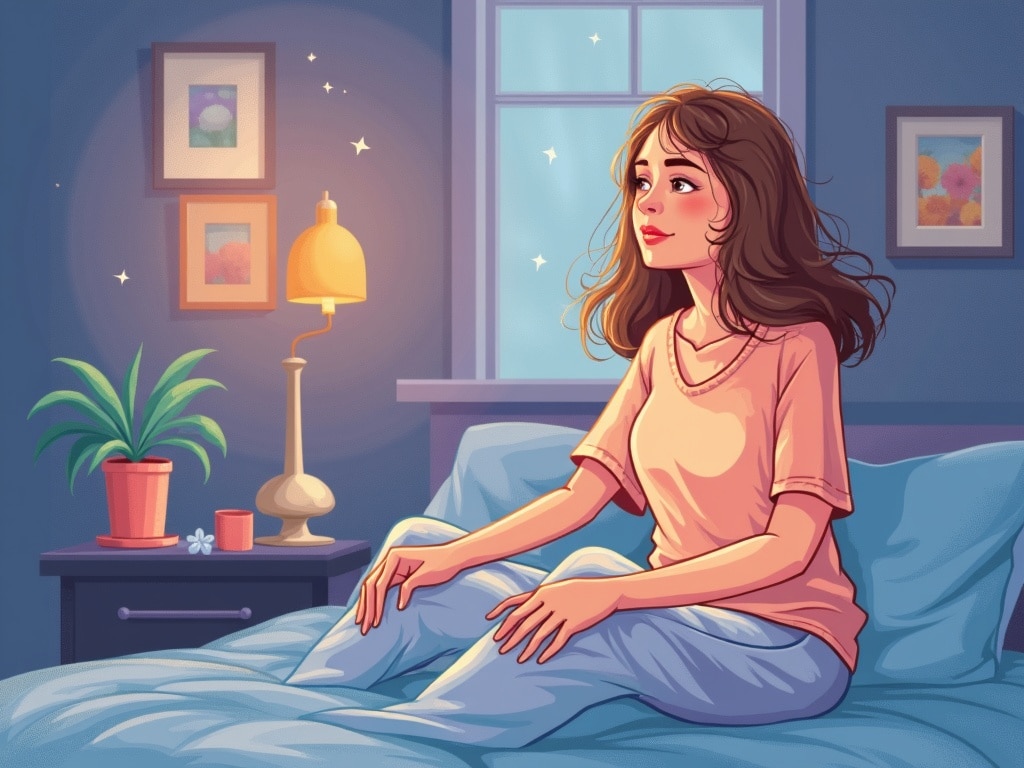Menopause Insomnia Relief Without Hormones: Reclaim Your Sleep
Are you staring at the ceiling at 3 AM, mind racing, wondering if you’ll ever get a decent night's sleep again? If you're navigating the turbulent waters of menopause, the unwelcome companion of insomnia might feel like the final straw. The good news? You're not alone, and more importantly, you *canfind relief without resorting to hormone replacement therapy (HRT). This article dives into effective, hormone-free strategies to help you reclaim your sleep and rediscover restful nights.
Understanding the Menopause-Insomnia Connection
Menopause, defined as the cessation of menstruation, typically occurs in a woman's late 40s or early 50s. This significant life transition involves a complex interplay of hormonal fluctuations, primarily a decline in estrogen and progesterone. These hormonal shifts can trigger a cascade of symptoms, including hot flashes, night sweats, mood swings, and, you guessed it, insomnia.
But why does this hormonal rollercoaster specifically lead to sleep disturbances?
**Estrogen's Role:Estrogen influences the production of neurotransmitters like serotonin, which plays a crucial role in regulating mood and sleep. Lower estrogen levels can therefore disrupt the delicate balance of these neurotransmitters, leading to sleep difficulties.
**Progesterone's Impact:Progesterone has a calming effect on the nervous system. As progesterone levels decline, it can contribute to increased anxiety and restlessness, making it harder to fall asleep and stay asleep.
**Hot Flashes and Night Sweats:These vasomotor symptoms are perhaps the most notorious menopausal challenges. The sudden surges of heat and perspiration can jolt you awake in the middle of the night, disrupting your sleep cycle and leading to fragmented, restless sleep.
Why Choose Hormone-Free Insomnia Relief?
Hormone replacement therapy (HRT) can be an effective treatment option for some women experiencing severe menopausal symptoms, including insomnia. However, it's not the right choice for everyone. Some women may prefer to avoid HRT due to personal preferences, medical history, or concerns about potential side effects. Fortunately, numerous non-hormonal strategies can effectively address menopause-related insomnia.
Lifestyle Adjustments for Better Sleep
Often, the most effective solutions are rooted in simple yet powerful lifestyle modifications.
Optimizing Your Sleep Hygiene
Sleep hygiene refers to a collection of habits and practices that promote healthy sleep. Implementing these strategies can significantly improve your sleep quality:
**Maintain a Consistent Sleep Schedule:Go to bed and wake up at the same time every day, even on weekends, to regulate your body's natural sleep-wake cycle (circadian rhythm).
**Create a Relaxing Bedtime Routine:Wind down with calming activities like reading, taking a warm bath, or listening to soothing music. Avoid screen time (phones, tablets, computers) for at least an hour before bed, as the blue light emitted from these devices can interfere with melatonin production.
**Optimize Your Sleep Environment:Ensure your bedroom is dark, quiet, and cool. Use blackout curtains, earplugs, or a white noise machine to minimize distractions. The ideal bedroom temperature for sleep is typically between 60-67 degrees Fahrenheit (15-19 degrees Celsius).
Dietary Strategies for Sleep
What you eat and when you eat it can significantly impact your sleep.
**Limit Caffeine and Alcohol:Avoid caffeine, especially in the afternoon and evening, as it's a stimulant that can interfere with sleep. While alcohol may initially make you feel drowsy, it can disrupt your sleep later in the night, leading to fragmented and restless sleep.
**Avoid Large Meals Before Bed:Eating a heavy meal close to bedtime can interfere with sleep. Allow at least 2-3 hours for digestion before going to bed.
**Consider a Light Bedtime Snack:A small snack containing complex carbohydrates and protein, such as a handful of almonds with a small piece of fruit, can help promote sleep by regulating blood sugar levels.
**Stay Hydrated:Dehydration can lead to leg cramps and other discomforts that disrupt sleep. Drink plenty of water throughout the day, but limit fluids close to bedtime to reduce nighttime awakenings.
Exercise and Physical Activity
Regular physical activity can improve sleep quality, but timing is crucial.
**Engage in Regular Exercise:Aim for at least 30 minutes of moderate-intensity exercise most days of the week.
**Avoid Strenuous Exercise Close to Bedtime:Exercising too close to bedtime can have a stimulating effect, making it harder to fall asleep. Finish your workout at least 3 hours before bed.

Natural Supplements and Remedies
Several natural supplements and remedies may help alleviate menopause-related insomnia. Always consult with your healthcare provider before starting any new supplement, especially if you have underlying health conditions or are taking other medications.
**Melatonin:This hormone regulates the sleep-wake cycle. While your body naturally produces melatonin, supplementation may help improve sleep onset and duration, especially for those with disrupted circadian rhythms. Start with a low dose (0.5-1 mg) and gradually increase if needed, up to a maximum of 5 mg.
**Magnesium:This mineral plays a role in muscle relaxation and nerve function. Magnesium deficiency can contribute to insomnia. Consider taking a magnesium supplement or incorporating magnesium-rich foods into your diet, such as leafy green vegetables, nuts, and seeds.
**Valerian Root:This herb has been used for centuries as a natural sleep aid. It is believed to have a calming effect on the nervous system.
**Chamomile:This herb is known for its calming and relaxing properties. Drinking chamomile tea before bed can help promote sleep.
**L-Theanine:This amino acid, found in green tea, has been shown to promote relaxation and reduce anxiety. It can help improve sleep quality without causing drowsiness.
Mind-Body Techniques for Insomnia Relief
Stress and anxiety are significant contributors to insomnia, especially during menopause. Mind-body techniques can help quiet your mind and promote relaxation, making it easier to fall asleep and stay asleep.
**Cognitive Behavioral Therapy for Insomnia (CBT-I):CBT-I is a structured program that helps you identify and change thoughts and behaviors that contribute to insomnia. It is considered the gold standard treatment for chronic insomnia and has been shown to be highly effective. Speaking with a therapist is a great option, but there are also apps like and other resources you can find online.
**Mindfulness Meditation:This practice involves focusing on the present moment without judgment. It can help reduce stress and anxiety and promote relaxation, making it easier to fall asleep.
**Deep Breathing Exercises:Practicing deep, slow breathing can activate the parasympathetic nervous system, which promotes relaxation and reduces stress.
**Progressive Muscle Relaxation:This technique involves tensing and relaxing different muscle groups in your body, which can help reduce muscle tension and promote relaxation.
**Yoga and Tai Chi:These practices combine physical postures, breathing techniques, and meditation, which can help reduce stress, improve sleep, and enhance overall well-being.
Addressing Underlying Medical Conditions
In some cases, insomnia may be a symptom of an underlying medical condition. It's essential to rule out any other potential causes of your sleep problems.
**Talk to Your Doctor:Discuss your sleep difficulties with your healthcare provider to rule out any underlying medical conditions, such as thyroid problems, sleep apnea, restless legs syndrome, or depression.
**Manage Chronic Pain:Chronic pain can significantly interfere with sleep. Work with your doctor to manage your pain effectively.
**Address Mood Disorders:Depression and anxiety are common during menopause and can contribute to insomnia. Seek treatment for these conditions if needed.
The Power of Patience and Persistence
Finding the right solution for menopause-related insomnia may take time and experimentation. Be patient with yourself and don't get discouraged if you don't see results immediately. It's crucial to be consistent with your chosen strategies and to track your progress. Keep a sleep diary to monitor your sleep patterns and identify any triggers that may be contributing to your insomnia.
Ultimately, reclaiming your sleep during menopause is possible without relying on hormones. By implementing these lifestyle adjustments, exploring natural remedies, practicing mind-body techniques, and addressing any underlying medical conditions, you can pave the way for restful nights and a brighter, more energized future. Sweet dreams await!

